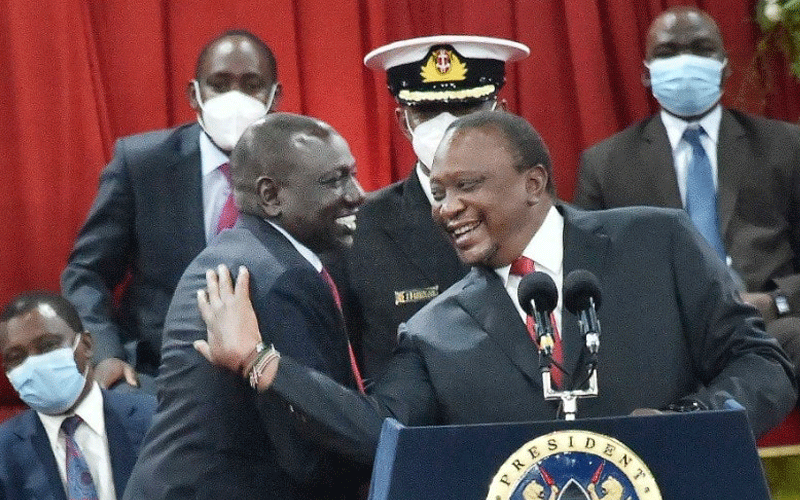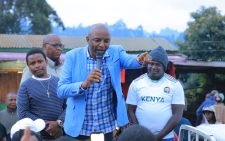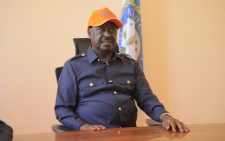Battle lines drawn as Uhuru, Ruto clash over report

Emeka-Mayaka Gekara
What was billed as an event to kick-start the journey to amend the Constitution through the Building Bridges Initiative (BBI), turned out to be a showdown as President Uhuru Kenyatta told off his deputy for opposing the project.
While the Head of State and his Handshake partner Raila Odinga rallied nearly 6,000 delegates gathered at the Bomas of Kenya in support of BBI proposals, Deputy President William Ruto muddied the waters by poking holes in the document.
There was every indication Ruto was laying the ground to campaign against the document unless some of the issues he raised are addressed.
Ruto, who was jeered by a section of the delegates, faulted the proposed expansion of the Executive, saying it does not address the winner-take-all system. He also faulted the structure of the Senate, arguing that it had been weakened by denying it a role in revenue allocation.
According to him, if adopted, the BBI report would interfere with the independence of the Judiciary and police service.
He also took issue with the proposal for political parties to nominate members of the Independent and Electoral and Boundaries Commission (IEBC).
But his boss, who sat between Raila and Ruto and listened attentively as his deputy criticised the BBI proposals, seemed to accuse the DP of being insincere, saying he (Ruto) was aware of the entire reform initiative. “I consulted the Deputy President over the BBI and he even helped in recruitment of the taskforce members.”
For the first time, differences between the President and his deputy played out in the open with Uhuru being forced to abandon his official written speech to respond to Ruto who appeared to distance himself from the BBI project.
The President repeated the genesis of his differences with Ruto, blaming it on early campaigns by the DP.
“We were elected together but he got immersed into 2022 succession and abandoned our agenda.
Let us be patient. We were running a relay but instead of him waiting for the baton, William started running backwards,” the President said, throwing the delegates, including the DP, into sustained laughter.
Speakers at the forum pushed for a compromise to ensure an “uncontested referendum” but that seems highly unlikely given Ruto’s list of demands.
The Deputy President was in many ways an “unwanted visitor” at the event, having criticised the BBI proposals at the weekend, saying the project was meant to create jobs for “a few big boys”.
The BBI has proposed radical constitutional reforms that could alter the structure of the Executive by creating the position of Prime Minister with two deputies.
It also proposes the increase of county funds allocation from the current 15 per cent to 35 per cent, establishment of a Ward Development Fund, a seven-year tax holiday for small businesses — what Ruto calls hustlers — a commission for the youth and another for health workers.
Sharing positions
The project seeks to address the problematic gender equity question by creating more seats for women and offers a four-year grace period for beneficiaries of the Higher Education Loans Board (Helb), among other wide-ranging proposals.
The BBI is a product of the March 2018 Handshake between Uhuru and Raila as part of their nine-point agenda to address what they consider as some of the most pressing issues facing the country.
“The main aim of BBI was to end violence after every five years. Our aim is to unite the country and prevent loss of lives,” Uhuru told the delegates yesterday. “If you have any reservations bring your recommendations so that we can improve on the document. It is not about sharing positions.”
Addressing the delegates before inviting Ruto to the podium, Raila traced the constitutional reform process to the 1994 Bomas talks which resulted in the initial draft in which he participated as a delegate. The ODM leader made a spirited pitch for a review of the 2010 Constitution.
“We were here in 1994 and came up with the Bomas Draft. We then had the Kilifi and Wako draft that was defeated during the 2005 referendum of bananas and oranges because we were not comfortable with some of the provisions,” he said.
“Then came 2007, the talks chaired by Kofi Annan made it one of the Agenda Four items.
The result is the current Constitution which has been hailed all over the world as very democratic.
But the 2010 Constitution was a ceasefire document. We agreed that it can be improved to address some of the issues facing the country.”
Amani National Congress leader Musalia Mudavadi, Wiper Party leader Kalonzo Musyoka and Ford Kenya leaders Moses Wetang’ula and Wafula Wamunyinyi, all endorsed the document.
Others who spoke at the function included former Bomet Governor and Chama Cha Mashinani leader Isaac Ruto, Machakos Governor Alfred Mutua, his Kitui counterpart Charity Ngilu as well as Nick Salat, the former ruling party Kanu secretary general.
Mudavadi advised that the country should move to improve the 67 per cent approval given to the 2010 Constitution at the referendum.
“Issues that BBI sought to resolve are real issues that affect us and if we do nothing about them they will continue to affect us.
The document has good provisions but they need to be enhanced,” he said. He particularly opposed the proposal to have the Judiciary Ombudsman appointed by the President.
The BBI has suggested creation of the office of an Ombudsman to process complaints from the public.
The official will also sit in the Judicial Service Commission, the organ that appoints judges, including the Chief Justice.
According to Mudavadi, the Ombudsman should be appointed by the Chief Justice to protect the independence of the Judiciary.
“The 2010 Constitution had a 67 per cent acceptance rate, I want to beseech Kenyans that we work together so that when we get to the referendum we only better this one and this can only be done through consensus,” he said.
In his speech, Ruto faulted the Ombudsman proposal and instead pushed for operationalisation of the Judiciary Fund to enable the hiring of more judges.
He also rejected suggestions that parties be allowed to nominate members to the IEBC. “How fair will be a league where the referee is appointed by some teams.
If you persuade me that the league will be fair, then it is okay. I have my reservations and I need to be persuaded. I have a different opinion,” he told jeering delegates.
The DP also expressed concern about a recommendation to create a council to replace the Police Service. According to the proposal, the council would be chaired by the Interior Cabinet Secretary.
“The Constitution is clear that police must be independent from any interference from politicians.
So to set up a police council to be chaired by a CS is a derogation of their independence.
Today you might have the latitude to do what is right as per you, but tomorrow the shoe might in the other leg.”
The sometimes charged meeting observed a moment of silence for departed senior lawyer Nzamba Kitonga, who chaired the Committee of Experts that put together the 2010 Constitution.
President Kenyatta and Raila eulogised Kitonga as a legal giant whose contribution to Kenya’s constitutional journey was immense.












